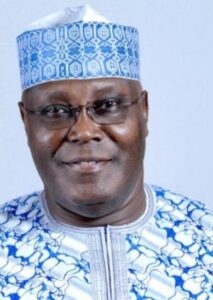Tinubu’s Government Is the Most Ineffective in Nigeria’s History – Atiku
Tinubu’s Government Is the Most Ineffective in Nigeria’s History – Atiku

According to former Vice President Atiku Abubakar, the administration of President Bola Ahmed Tinubu has, within just two years, demonstrated unprecedented levels of incompetence, disconnect from ordinary Nigerians, and a blatant disregard for good governance. In his view, no other democratic government in Nigeria’s history has imposed such widespread suffering while exhibiting so little commitment to transparency or accountability.
Atiku criticized the government for deepening poverty nationwide and setting troubling records in irresponsible public spending. He noted that while millions of Nigerians struggle to afford basic necessities, public officials continue to live in luxury, pushing through budgets that prioritize the elite and marginalize the average citizen.
He lamented that Nigeria has not only retained its status as the poverty capital of the world but is now also leading in child malnutrition in Africa — surpassing even Sudan, a war-torn country. The 2024 Global Hunger Index places Nigeria among the nations most affected by food insecurity and malnutrition, ranking 18th globally.
The policies introduced by the Tinubu-led government, Atiku argued, have consistently burdened the poor while offering privileges to the wealthy. Across sectors — from healthcare and education to public services and identity registration — the divide between rich and poor has widened significantly. For instance, just recently, the National Identity Management Commission (NIMC) raised service fees by 75% and introduced a VIP protocol, turning essential services into a privilege for the wealthy.
In education, public university tuition has become unaffordable for many, with no sufficient scholarship or financial aid programs in place to support underprivileged students.
Atiku also voiced alarm over the federal government’s excessive borrowing. When President Tinubu assumed office in 2023, Nigeria’s total debt was about N49 trillion. In under two years, that figure has ballooned to N144 trillion — a staggering 150% increase — with additional loans being pursued that could push the debt to N183 trillion.
In contrast, several state governments have demonstrated greater fiscal responsibility, cutting their debt from N5.86 trillion to N3.97 trillion. Atiku said this proves the federal government is largely responsible for the nation’s debt crisis.
He dismissed the government’s claim that increased borrowing is necessary to finance the 2025 budget and cushion the removal of fuel subsidies, arguing that the chaotic and unplanned manner of the subsidy removal itself is the root cause of the economic difficulties facing citizens today.
“At present,” he stated, “Nigeria has become a country where the wealthy thrive while the poor are punished for merely trying to survive. This inequality can no longer be ignored.”
He further emphasized the importance of preserving Nigeria’s democratic values, warning against any move toward authoritarianism. He condemned efforts to suppress dissent and create a one-party state.
Atiku reaffirmed the opposition’s resolve to resist the administration’s excesses and ensure a return to people-centered governance. He announced the formation of a broad, united opposition coalition dedicated to holding the government accountable and protecting the rights of all Nigerians.
“Our mission is to rescue this country,” he declared. “And we will not relent until that vision becomes reality.” — AA
TRENDING SONGS
 RCCG PASTOR ANGRY OVER CALLING Him“MR” INSTEAD OF “DR,” DECLARES CURSE ONLINE
RCCG PASTOR ANGRY OVER CALLING Him“MR” INSTEAD OF “DR,” DECLARES CURSE ONLINE
 NPMA Appeals to Nigerian Government for Compensation After Lagos Market Fire
NPMA Appeals to Nigerian Government for Compensation After Lagos Market Fire
 Rest Every Four Hours, FRSC Issues Safety Guide for Fasting Motorists
Rest Every Four Hours, FRSC Issues Safety Guide for Fasting Motorists
 NNPC Boss Ojulari Bags UK Energy Institute Fellowship
NNPC Boss Ojulari Bags UK Energy Institute Fellowship
 Shock in Anambra: Bride Disappears Moments Before Wedding
Shock in Anambra: Bride Disappears Moments Before Wedding
 Nigerian Woman Returns ₦330 Million Accidentally Credited to Her Account
Nigerian Woman Returns ₦330 Million Accidentally Credited to Her Account
 APC Don Reach Morocco?’ VeryDarkMan Reacts to Seyi Tinubu Poster
APC Don Reach Morocco?’ VeryDarkMan Reacts to Seyi Tinubu Poster
 Bride Breaks Down in Tears as Wedding Meals Were Kept Secretly While Guests Go Home Hungry
Bride Breaks Down in Tears as Wedding Meals Were Kept Secretly While Guests Go Home Hungry
 Odogwu by Day, Robber by Night: How Marriage Joy Turned Into Tragedy
Odogwu by Day, Robber by Night: How Marriage Joy Turned Into Tragedy
 Nigerian Officials Allegedly Pocket N4–6B Weekly Through Smuggling Cartels at Seme–Badagry Border
Nigerian Officials Allegedly Pocket N4–6B Weekly Through Smuggling Cartels at Seme–Badagry Border
Share this post with your friends on ![]()













